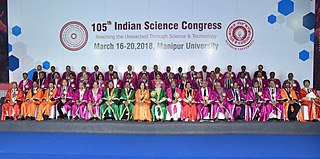Related Research Articles
F1000 is an open research publisher for scientists, scholars, and clinical researchers. F1000 offers a different research evaluation service from standard academic journals by offering peer-review after, rather than before, publishing a research article. Initially, F1000 was named after the 1,000 faculty members that performed peer-reviews, but over time F1000 expanded to more than 8,000 members. When F1000 was acquired by Taylor & Francis Group in January 2020, it kept the publishing services. F1000Prime and F1000 Workspace were acquired by different brands.
SCIgen is a paper generator that uses context-free grammar to randomly generate nonsense in the form of computer science research papers. Its original data source was a collection of computer science papers downloaded from CiteSeer. All elements of the papers are formed, including graphs, diagrams, and citations. Created by scientists at the Massachusetts Institute of Technology, its stated aim is "to maximize amusement, rather than coherence." Originally created in 2005 to expose the lack of scrutiny of submissions to conferences, the generator subsequently became used, primarily by Chinese academics, to create large numbers of fraudulent conference submissions, leading to the retraction of 122 SCIgen generated papers and the creation of detection software to combat its use.
Medknow Publications also known as Wolters Kluwer Medknow or simply Medknow, is a publisher of academic journals on behalf of learned societies and associations. Previously an independent Indian publisher, Medknow is now part of within Wolters Kluwer's Health Division, and is part of Wolters Kluwer India.
WMSCI, the World Multi-conference on Systemics, Cybernetics and Informatics, is a conference that has occurred annually since 1995, which emphasizes the systemic relationships that exist or might exist among different disciplines in the fields of Systemics, Cybernetics, and Informatics. Critics describe the conference as having "loose standards", since it has accepted papers of dubious academic merit. Organizers stress interdisciplinary communication, describing the conference as both wide in scope as a general international scientific meeting, and specifically focused in the manner of a subject-area conference.

An academic conference or scientific conference is an event for researchers to present and discuss their scholarly work. Together with academic or scientific journals and Preprint archives such as arXiv, conferences provide an important channel for exchange of information between researchers. Further benefits of participating in academic conferences include learning effects in terms of presentation skills and “academic habitus”, receiving feedback from peers for one’s own research, the possibility to engage in informal communication with peers about work opportunities and collaborations, and getting an overview of current research in one or more disciplines.

Indian Science Congress Association(ISCA) is a premier scientific organisation of India with headquarters at Kolkata, West Bengal. The association started in the year 1914 in Kolkata and it meets annually in the first week of January. It has a membership of more than 30,000 scientists.

Intelligent Systems for Molecular Biology (ISMB) is an annual academic conference on the subjects of bioinformatics and computational biology organised by the International Society for Computational Biology (ISCB). The principal focus of the conference is on the development and application of advanced computational methods for biological problems. The conference has been held every year since 1993 and has grown to become one of the largest and most prestigious meetings in these fields, hosting over 2,000 delegates in 2004. From the first meeting, ISMB has been held in locations worldwide; since 2007, meetings have been located in Europe and North America in alternating years. Since 2004, European meetings have been held jointly with the European Conference on Computational Biology (ECCB).
MDPI is a publisher of open access scientific journals. Founded by Shu-Kun Lin as a chemical sample archive, it now publishes over 390 peer-reviewed, open access journals. MDPI is the largest open access publisher in the world and the fifth largest publisher overall in terms of journal paper output. The number of published papers has been growing significantly in the last decade with year over year growth of over 50% in 2017, 2018 and 2019.

FEBS Letters is a not-for-profit peer-reviewed scientific journal published on behalf of the Federation of European Biochemical Societies (FEBS) by Wiley. It covers all aspects of molecular biosciences, including molecular biology and biochemistry. The aim of the journal is to publish primary research in the form of Research Articles, Research Letters, Communications and Hypotheses, as well as secondary research in the form of Review articles. The journal also publishes a News and Views column called "The Scientists' Forum". The editorial office of FEBS Letters is based in Heidelberg, Germany. The journal income is reinvested in science.
e-Century Publishing Corporation is a publisher of seventeen open access scientific journals based in Madison, Wisconsin. 11 of them are indexed in the Web of Science, including the American Journal of Translational Research, the American Journal of Cancer Research, the International Journal of Clinical and Experimental Medicine, and the International Journal of Clinical and Experimental Pathology. The publisher was included on Beall's list before it was taken down in 2017.

Bentham Science Publishers is a company that publishes scientific, technical, and medical journals and e-books. It publishes over 100 subscription-based academic journals and almost 40 open access journals.
The World Academy of Science, Engineering and Technology or WASET is a predatory publisher of open access academic journals. The publisher has been listed as a "potential, possible, or probable" predatory publisher by American library scientist Jeffrey Beall and is listed as such by the Max Planck Society and Stop Predatory Journals. WASET's estimated annual revenue in 2017 alone was over $4 million, with other estimates ranging from $8.9 million to $11.9 million for the years 2014 to 2019 combined.

John Bohannon is an American science journalist and scientist who is Director of Science at Primer, an artificial intelligence company headquartered in San Francisco, California. He is known for his career prior to Primer as a science journalist and Harvard University biologist, most notably with his "Gonzo Scientist" online series at Science Magazine and his creation of the annual "Dance Your PhD" contest. His investigative journalism work includes:

OMICS Publishing Group is a predatory publisher of open access academic journals. It started publishing its first journal in 2008. By 2015, it claimed over 700 journals, although about half of them were defunct. Its subsidiaries and brands include Allied Academies, Conference Series LLC LTD, EuroSciCon LTD, Hilaris Publishing, iMedPub LTD, Longdom Publishing SL, Meetings International, Pulsus Group, Research & Reviews, SciTechnol, Trade Science Inc.

Predatory publishing, also write-only publishing or deceptive publishing, is an exploitative academic publishing business model that involves charging publication fees to authors without checking articles for quality and legitimacy, and without providing editorial and publishing services that legitimate academic journals provide, whether open access or not. The phenomenon of "open access predatory publishers" was first noticed by Jeffrey Beall, when he described "publishers that are ready to publish any article for payment". However, criticisms about the label "predatory" have been raised. A lengthy review of the controversy started by Beall appears in The Journal of Academic Librarianship.

"Who's Afraid of Peer Review?" is an article written by Science correspondent John Bohannon that describes his investigation of peer review among fee-charging open-access journals. Between January and August 2013, Bohannon submitted fake scientific papers to 304 journals owned by fee-charging open access publishers. The papers, writes Bohannon, "were designed with such grave and obvious scientific flaws that they should have been rejected immediately by editors and peer reviewers", but 60% of the journals accepted them. The article and associated data were published in the 4 October 2013 issue of Science as open access.

Jeffrey Beall is an American librarian and library scientist, best known for drawing attention to "predatory open access publishing", a term he coined, and for creating what is now widely known as Beall's list, a list of potentially predatory open-access publishers. He is a critic of the open access publishing movement and particularly how predatory publishers use the open access concept, and is especially known for his blog Scholarly Open Access. He has also written on this topic in The Charleston Advisor, in Nature, in Learned Publishing, and elsewhere.
Predatory conferences or predatory meetings are meetings set up to appear as legitimate scientific conferences but which are exploitative as they do not provide proper editorial control over presentations, and advertising can include claims of involvement of prominent academics who are, in fact, uninvolved. They are an expansion of the predatory publishing business model, which involves the creation of academic publications built around an exploitative business model that generally involves charging publication fees to authors without providing the editorial and publishing services associated with legitimate journals.
Dashun Wang is a Professor of Management and Organizations at the Kellogg School of Management and the McCormick School of Engineering, at Northwestern University since 2016. At Kellogg from 2019, he is the Founding Director of the Center for Science of Science and Innovation (CSSI). He is also a core faculty at the Northwestern Institute on Complex Systems (NICO) and an Adjunct Professor of Department of Physics, at Northeastern University. His current research focus is on Science of Science. Dashun is a recipient of the AFOSR Young Investigator award (2016) and Poets & Quants Best 40 Under 40 Professors (2019).
References
- ↑ "BIT Congress Inc. Company Information". dnb.com. Retrieved 20 October 2015.
- ↑ "Conference kerfuffle hits scientists". The-scientist.com. Retrieved 7 Feb 2014.
- ↑ Cohen, John (2013-04-10). "Meetings That Flatter, but May Not Deliver". Science. 342 (6154): 76–7. Bibcode:2013Sci...342...76C. doi: 10.1126/science.342.6154.76 . PMID 24092733.
- ↑ Kolata, Gina (8 April 2013). "Scientific Articles Accepted (Personal Checks, Too)". New York Times. Retrieved 7 Feb 2014.
- ↑ "Warning on rising hoax conference invites". Medical Observer. Retrieved 7 Feb 2014.
- ↑ "In the pipeline". Corante. Archived from the original on 2014-02-22. Retrieved 7 Feb 2014.
- ↑ "Fake scientific conferences are like genuine scientific conferences". Scimedskeptic. Retrieved 7 Feb 2014.
- ↑ "More fake scientific conferences". Archived from the original on 2013-10-12. Retrieved 7 Feb 2014.